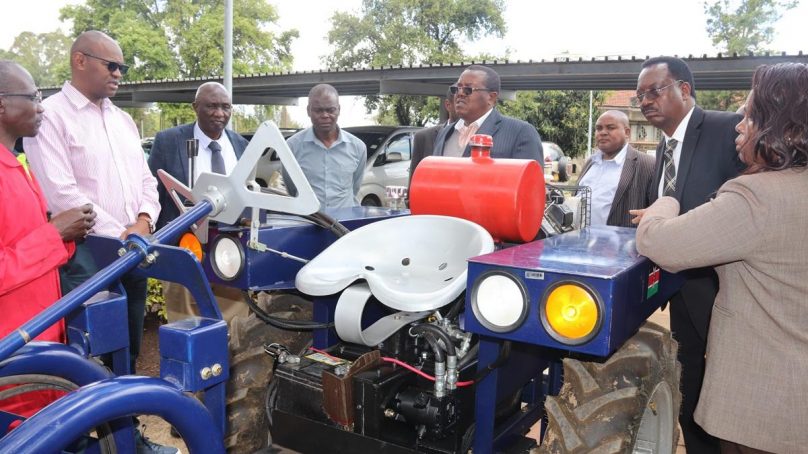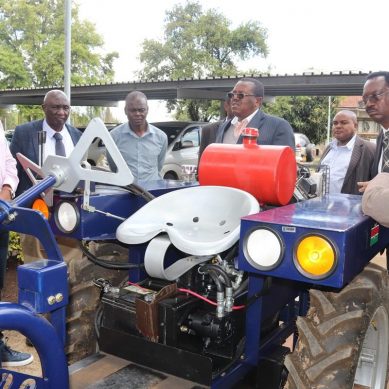
Egerton University has secured a strategic partnership with US-based IROC Tractors and Agypro International for establishment of local assembly of fit-for-purpose tractors that will deliver world class agricultural equipment to local farmers and boost the uptake of mechanized farming in the country.
Under the deal, the university will assemble modern, high-quality fit-for-purpose tractors specifically matched to the unique operational requirements, terrain, and tasks of a particular farm or project. The fit-for-purpose tractors are said to be different from traditional general-purpose or utility tractors, which are built for versatility across a wide range of tasks.
The deal was signed by Egerton University Vice Chancellor Isaac Kibwage, Jaclyn Schess and Mike Christensen from the Idaho-based IROC Tractors and Agypro International’s Bill Bough Miller and Emmanuel Juma who is the Country Manager, Agypro Kenya.
University Council Chair James Sang said that by locally assembling, the tractors that will go by the brand name IROC, the institution intends to deliver world-class agricultural equipment to local farmers.
The initiative, Prof Sang said will eliminate reliance on manual labour, improve agronomical practices and bolster yields while creating a lasting impact for the local economy. He stated that the initiative being undertaken by the Faculty of Engineering and Technology demonstrates the power of partnership in driving innovation and sustainability.
He added that they expect the partnership to boost industrialisation, bolster job creation efforts especially in the agricultural machinery manufacturing sector, help expand technical and mechanical skills development and value addition and enhance mechanization in Kenya’s agriculture.
“By assembling IROC tractors locally, we are not only boosting the uptake of mechanised farming but we are also enhancing Kenya’s position as a regional hub for agricultural machinery production,” added the chairman.
Prof Sang spoke when he led the university’s council members to review progress on the ongoing assembly of the tractor’s prototype that is being carried out by engineering students and their lecturers at the institution’s faculty of engineering and technology.
Technicians showcased the prototype tractor’s chassis, engine fit-out, hydraulics and operator platform, noting that modular design and sourcing of some parts locally are expected to lower costs of production and make maintenance easier.
“The prototype unit is currently running on a 22-horsepower engine, with engineers and students calibrating its performance for Kenya’s diverse terrain,” prof. Sang elaborated.
The chairman observed that farming communities in Africa with access to just one tractor are planting their crops up to 40 times quicker thus reducing planting costs by a third, and eventually tripling their farm’s output.
He, however, said that for many African farms which are small, at an average of 1.3 hectares, it was both uneconomical and impractical to buy or lease standard tractors that are designed to plough huge chunks of land.
The chairman explained that the tractor comes with two spots for hooking up implements; one at the front and another at the back. This setup, he added lets the person driving do two tasks at once without stopping to switch out the tools adding that the design was allowing farmers do various tasks like ploughing and planting and preparing soil all at once, cutting down on the time and energy needed to switch between different implements.
Prof Sang who was flanked by Vice-Chancellor Isaac Kibwage and eight members of the council during the inspection, said that in the realm of agriculture small farms will find great use in the equipment in tasks like turning over soil, sowing seeds and moving goods from one place to another.
He explained that the tractor’s design was compact, making it simple to move around in small areas and because it’s not that heavy it would not mess up the soil much. Sang pointed out that the tractor was designed to ensure that farmers planted their crops on time which increases crop yield by 12-69 per cent.
During the demonstration, the University Council emphasised a key condition: despite local assembly, the unit cost must be compliant with global standards and be readily affordable to ensure uptake by Kenyan farmers.
Vice Chancellor Kibwage underscored the importance of the partnership in fostering innovation and offering practical solutions for agricultural mechanization. He noted that the collaboration should culminate in the establishment of a local tractor assembly unit at Egerton University, which would facilitate the sale of tractor parts and fully assembled units to local farmers.
He described the tractor as a modern yet simple solution aimed at transforming smallholder farming. The tractor he said is designed for small scale farmers who cannot afford the bigger and more expensive machines. He said the tractor is tailor made for Kenya’s small farms, where most farmers cultivate less than five acres.
Kibwage explained that its versatile set up will allow farmers to perform several operations with one machine- from land preparation to furrow making and ridging. He emphasised that many small holders have depended on manual labour, which is not only time consuming but also physically exhausting.
Mechanisation, precision agriculture and adoption of innovative modern technologies such as Artificial Intelligence have been identified as key interventions to boost local production and reduce post-harvest losses. However, for decades, the high cost of machinery has locked out smallholder farmers, who produce more than 70 per cent of the country’s food.
Prof Kibwage believes that affordable technologies like this fit-for-purpose tractor can help reverse this trend. “This technology is relevant and important because it gives small holder farmers a chance to mechanize their farms without breaking the bank.
It will help address issues of food security and hunger in the country by making production easier and faster,” he added.
Mr Miller of Agypro International expressed confidence in the collaboration, noting that their team is already operating in Kenya and views Egerton University as the ideal partner. He commended the university for demonstrating strong commitment and progress in the ongoing partnership.
Miller added that the IROC tractor is currently being tested and calibrated by Egerton University engineers and engineering students to suit Kenya’s diverse topography, while ensuring it is user-friendly, affordable, easy to maintain, and suitable for both men and women farmers.
- A Tell Media / KNA report / By Esther Mwangi
Egerton University Council members inspect a prototype of a tractor that is being assembled by the institution’s Faculty of Engineering students and lecturers. Picture by Esther Mwangi






